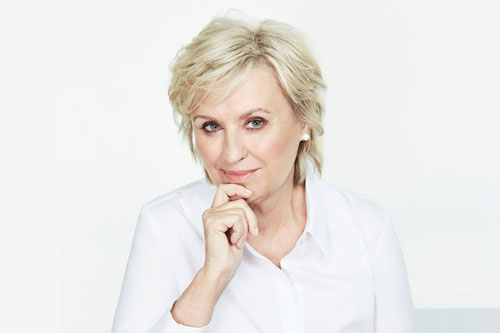The former Vanity Fair and New Yorker editor was speaking at the Harold Evans Memorial Lecture in memory of her late husband, hosted by City, University of London’s Department of Journalism
By Chris Lines (Senior Communications Officer), Published
Tina Brown last night warned Prince Harry that even a ‘benign’ memoir could lead to further problems with the wider Royal Family.
Tina was speaking at the Harold Evans Memorial Lecture at City, University of London’s Oliver Thompson Lecture Theatre on Thursday 13 October.
In front of a large audience of students, staff, journalists and members of the public, Tina was in conversation with Professor Mel Bunce, Head of the Department of Journalism, on the subject of reporting royalty and her recent bestselling book, The Palace Papers, based on remarkable inside access to the lives of the Royal Family.
The book is the sequel to her 2007 New York Times bestselling biography of The Princess of Wales, The Diana Chronicles.
The pair discussed the role of royal correspondents, how the Monarchy use and misuse the media, and the future of both.
From 1981 until his death in 2020, Tina was married to the editor, publisher, and historian Sir Harold Evans.
It was an honour to host Tina [pictured] at City’s Department of Journalism to give the first in-person Harold Evans Memorial Lecture held in his memory.
On the subject of Prince Harry’s much-anticipated memoir, Tina said:
“Even if the book is supposedly benign, one of the things that are so difficult about the modern world and social media – all it takes is one line.
"When Sarah, Duchess of York, wrote her memoir, she was gushing about how wonderful Diana, Princess of Wales, was. But she had one story in there that said she had borrowed a pair of Diana's shoes and they gave her verrucas.
"That was it – boom. She was cut off from Diana, that was the end. So, all you need is one story, and the press will absolutely blow it up."
Pearls of wisdom
Tina offered the audience countless brilliant anecdotes and opinions across the evening from her long and distinguished career. Here are some selected highlights:
- “Even though I’m opinionated, I’m never casual about the facts.”
- On the Queen’s passing: “I thought there would be a collective nervous breakdown in our national identity. But the way it happened seemed to consolidate the national feeling of unity – it turned out to be a reassertion of national identity in the best way. It felt fitting because we know it’s the end of something we’re never going to see again.”
- On the Royals cautious approach to PR: “The more you know about people, the less you know about people because they are so managed in terms of PR.”
- On podcasts: "In a way, they are a combination of magazines and TV shows – they allow you to go through a narrative journey in a reflective way. And they feature some brilliant journalism."
- On her early career experiences as a woman: "My judgments and insights were not given equal weight to the men. When I won awards, I was called 'feisty' or 'frothy' – this is what we say to make women lesser. And it's hard for women to protest – if you make a fuss, it’s too nebulous."
- On the challenges Charles will face as King: "He's already gone viral on TikTok with the fountain pen incident, which was seen by more people than the coronation. The Queen never had to deal with that."
- On her editorial judgment: “I only ever did what interested me. If you’re a good editor, your story sense will resonate with other people. Like Diana Vreeland said: ‘Give them what they never knew they wanted’.”
- Tina’s closing thought, on journalism as a career path: "It is a great and noble profession, so please don’t get daunted that this is not a great time for structural support – you can still do it and you can still have a great impact."
About Tina Brown and Sir Harold Evans
Tina is an award-winning journalist, editor and author. Between 1979 and 2001, she was editor-in-chief of Tatler, Vanity Fair, The New Yorker and founder of the Daily Beast.
For services to journalism, she received a CBE in 2000. She founded Women in The World in 2009, a live journalism platform for female leaders, CEOs and global activists that saw sold-out summits in New York from 2010 to 2020. Some of the women who have given talks for Women in The World include Anna Wintour, Oprah Winfrey, and former US Secretary of State Hillary Clinton.
Sir Harold Evans was the editor of The Sunday Times between 1967 to 1981 and, for a year afterwards, editor of its sister title, The Times. During his time at the newspaper, he led a campaign to seek compensation for mothers who had taken the morning sickness drug thalidomide, resulting in them giving birth to children with deformities.
In 1984, Harold and Tina moved to the United States to pursue various editorial positions with publications such as US News & World Report, The Atlantic Monthly and the New York Daily News. In 1986, Sir Harold founded luxury and lifestyle travel magazine Condé Nast Traveler.
From 1980 to 1987, Sir Harold was appointed president and publisher of Random House. He edited for authors such as Maya Angelou and Neil Sheehan, and acquired the rights to Barack Obama’s memoir, Dreams from my Father, at the start of his political career. In 2000, Sir Harold retired from journalism to focus on writing. His book The American Century was published two years previously. He received the title of Knight Bachelor in 2004 for services to journalism.
